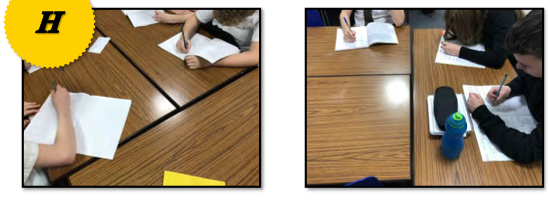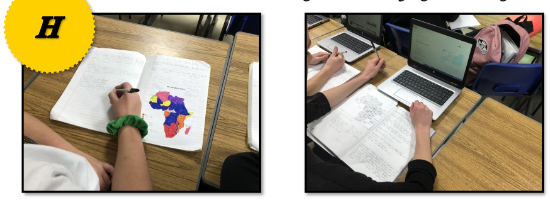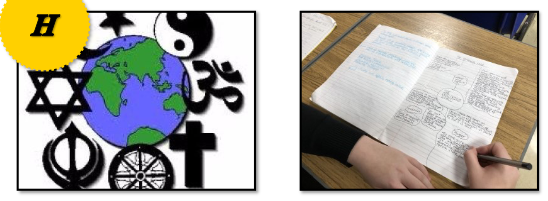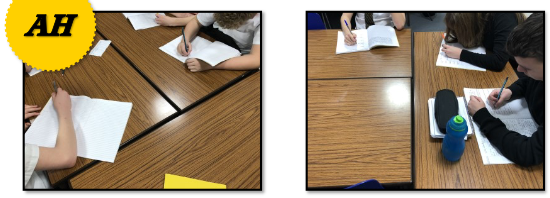Geography
What will I learn?
In Geography we study how natural and man-made environments around us have changed through time. Students will also acquire a new perspective on the biggest challenges facing our global society today.
Topics in the Higher course can be categorised into Physical Environments (e.g. the atmosphere, weather, glacial and coastal landscapes, soil and hydrology and flooding), Human Environments (e.g. urban management, rural issues, population change and the causes and consequences of migration) and Global Issues (e.g. climate change, river basin management, and development and health).
How will I learn?
Learning in National Geography involves a range of methods and approaches including making notes from presentations, reading textbooks, online research, simulation games and role playing tasks, group-work and outdoor fieldwork.
The course involves regular use of Ordinance Survey maps and time is spent helping students develop their ability to use these effectively. Some learning will also focus on exam revision techniques and answering typical past paper questions.
How will I be assessed?
Regular internal assessments will take place throughout the year to allow staff to monitor progress at this level. These will be marked using standardised marking schemes supplied by the SQA as appropriate.
Higher Geography students will complete an external examination set by the SQA. This exam will assess pupil’s knowledge, understanding and geographical skills, and is worth 80% of the final grade. The exam is comprised of two parts, the first lasting 1 hours 50 minutes and the second lasting 1 hour 10 minutes. Students will also carry out a research assignment, and write up a report in class, worth 27% of their final grade.
Career Opportunities
At its core, Geography is an interdisciplinary subject, meaning it connects different parts of many different subjects. Therefore, the skills gained from studying Geography are broad and diverse. These include skills related to basic map reading and orientation, persuasive writing, numeracy, creating and annotating visual information, working in a team and fieldwork.
The possible careers available to a student of Geography are equally broad and diverse. They might include careers like Environmental Consultant, Geologist, Renewable Energy Expert, University Lecturer, Journalist, Land Surveyor and Volcanologist, to name but a few.

History
What will I learn?
The Higher level course will develop knowledge and understanding across Scottish, British and European and World contexts.
- Migration and Empire, 1830–1939: Immigration to Scotland, Immigrant Experiences, Scottish Emigration and Scots Abroad.
- Britain 1850-1950: The Growth of Democracy, Female Suffrage, Effectiveness and Motives of Liberal and Labour Social Reforms.
- The Cold War 1945-1989: The origins of the Cold War, Soviet Control in Eastern Europe, The Cuban Missile Crisis, The Vietnam War, Détente and the end of the Cold War.
How will I learn?
Pupils will develop a better understanding of our nation’s past, and will more fully comprehend its part in global changes. Using a range of teaching strategies including; ICT, primary and secondary sources and class discussion, they will become more confident in:
- selecting and interpreting information from a variety of historical sources
- building knowledge and understanding of the factors contributing to historical events forming views on the significance of the causes/ consequences of historical events
- forming their own judgements on the importance of historical events, taking historians opinions in to consideration
How will I be assessed?
Assessment at Higher involves a written examination. Here pupils complete two papers. Paper 1 is based on essay writing skills and examines ability recall, organise and evaluate key information. Paper 2 assesses the candidates’ ability to evaluate source material and incorporate recalled knowledge.
Candidates also complete an assignment which is an extended piece of writing worth 30 marks (27% of their overall grade). The assignment allows the candidate to choose an area of history to study in more depth.
Career Opportunities
Careers paths in History, Politics, Journalism, Teaching and other related disciplines could be considered.

Modern Studies
What will I learn?
Modern Studies courses have three units:
- Democracy in the UK (constitutional arrangements, political parties, voting arrangements, role of parliament and citizens influence in politics)
- Social Issues (Health and wealth inequalities in Britain)
- International Issues (Development in Africa – Barriers to development, consequence of issues, government/non-government aid)
How will I learn?
Learning in Modern Studies involves a range of methods and approaches including regular discussions of current affairs, making notes from presentations, reading resource sheets, online- research, analysing sources of evidence and group presentation tasks.
Students are expected to gain knowledge of current issues but are also asked to evaluate and draw conclusions from new information provided to them.
How will I be assessed?
- Higher involves a written assignment (27%) and a final exam (73%).
- Small unit assessments will also be given at regular intervals to check progress.
- The assignments are on a topic chosen by the student, independently research and written up under exam conditions.
Career Opportunities
Modern Studies provides a chance to learn about modern UK life. The insights gained are of considerable value in a wide range of careers including online and broadcast media, publicity, social work, law and law enforcement, politics and journalism.

Politics
What will I learn?
The course covers 3 main units:
- Political Theory
- Political Systems (A comparison of the UK and the USA)
- Political Parties and Elections
How will I learn?
Learning in Politics involves a range of methods and approaches including regular discussions of current affairs and historic political events, making notes from presentations, reading resource sheets, online- research, analysing sources of evidence and group presentation and teaching tasks.
How will I be assessed?
Higher Politics has 3 assessment elements:
- Paper 1 – 3 Essays
- Paper 2 – 3 Skills Questions
- Assignment (27%) – this an essay on a topic chosen by the student, independently researched and written up under exam conditions.
Small unit assessments will also be given at regular intervals to check progress.
Career Opportunities
The insights gained are of considerable value in a wide range of careers. A number of students often choose politics as a subject at university. Specific careers include; law and law enforcement, journalism and a job in politics.

Religious, Moral and Philosophical Studies
What will I learn?
Buddhism Teachings of the Buddha, meditation, karma, nirvana, different branches of Buddhism, Buddhists in Britain and Asia.
Morality and Justice – Religious and non-religious views about the causes of crime, the purposes of punishment, responses to crime in the UK, Capital Punishment.
Religious and Philosophical Questions – Religious and nonreligious viewpoints on the origins of the universe and life. You will develop a range of skills including investigating religious, moral and philosophical questions and responses, critical analysis, evaluation, and the ability to express detailed, reasoned and well -structured views.
How will I learn?
Students will use textbooks, class booklets and take part in discussion. A large part of learning involves the use of religious and non-religious viewpoints from video and internet sources. Students will learn by:
- Interpreting and commenting on the meaning and context of religious sources
- Evaluating and expressing detailed, reasoned and well structured views about contemporary moral questions and responses
- Critically analysing religious and philosophical questions and response
How will I be assessed?
The qualification is graded A to D and there are two components:
- Question paper This assesses your ability to retain and combine knowledge and understanding and skills from across the course. This question paper will have 60 marks (80 at National 5) and is worth 67% of the total mark (at National 5 is worth 80%)
- Assignment This assesses your ability to apply skills, knowledge and understanding to a religious, moral or philosophical issue of your choice. The assignment will have 30 marks and is worth 33% of the total mark (20 at National 5 and is worth 20%)
Career Opportunities
All universities accept Higher RMPS. The RMPS course helps students develop as mature members of society who can contribute from a position of understanding and respect for others. In the world of work, employers look for someone with an enquiring mind, an appreciation of different viewpoints, and an ability to come to clear, balanced decisions. These skills are all developed through studying RMPS. If you intend to work with people in a care setting, journalism, publishing, teaching, counselling, social work, police or law, this course gives you plenty to think about and valuable expertise.

Advanced Higher History
What will I learn?
This course will focus on German history between the two world wars. This is a country who stands as an economic, cultural and political powerhouse in modern Europe but its journey through the twentieth century to get to its current position has been one of political and economic extremes. Germany from Democracy to Dictatorship, 1918–39 will examine the dramatically changing political landscape of Germany from its journey as a defeated and humiliated monarchy after World War One through a period of relative stability as a republican democracy to a right-wing totalitarian dictatorship under one of the most brutal regimes in history. The students will examine the reasons for these changes and how they affected politics, society, economy and foreign policy as well as looking at the leadership of Hitler and Nazi Germany, the consequences for its citizens and resistance and opposition to that regime.
How will I learn?
Students will engage in a significant amount of self- directed study (reading, research and note making) as well as lectures, seminars, group activities, presentations and debates. These activities, as well as essay writing and source handling skills will be taught to prepare students for the final exam but will also prepare them for higher education. The delivery of the course and the responsibilities of students in self- directed study is similar to that of a first year university course in Arts and Humanities.
How will I be assessed?
Students will be assessed through regular essay writing tasks and preparation for seminars and debates and presentations. The final exam consists of 2 essays and 3 source handling questions which lasts for 3 hours. There will also be a dissertation of 4000 words which must be completed over a period of time based on a question chosen from a set list linked to the topics studied.
Career Opportunities
Students of AH History have gone on to access a wide range of careers due to the broad spectrum of skills developed. From journalists to judges, politicians to police, lawyers to librarians and teachers to tour guides. The current British heir to the throne is also a graduate of history! This subject can take students into almost any avenue of further education and careers due to its status as a strong and well- respected academic subject.


